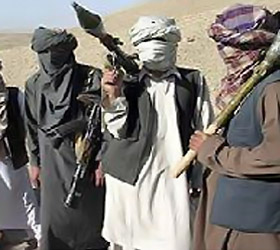 EDITORIAL (October 01 2010): Media reports tell of a request made by the US special envoy, Richard Holbrooke, to Bangladeshi foreign minister Dipu Moni to send combat troops to Afghanistan to help the international force defeat the militants. One wonders if the matter came up at the talks with Pakistan, when Holbrooke visited the country two weeks ago.
EDITORIAL (October 01 2010): Media reports tell of a request made by the US special envoy, Richard Holbrooke, to Bangladeshi foreign minister Dipu Moni to send combat troops to Afghanistan to help the international force defeat the militants. One wonders if the matter came up at the talks with Pakistan, when Holbrooke visited the country two weeks ago.
On the face of it, the request is based on the fact that Bangladesh is a Muslim majority country and soldiers, mostly Muslim, have a realisation of the religious sensitivities of the Afghan population. Already the Turkish army is in Afghanistan, as a part of the multinational force. What is more, Bangladesh is one of the major contributors to the United Nations Peacekeeping Missions around the world.
The Bangladeshi army’s first deployments under the mission came in 1988, when it participated in the UN peace operation UNIMOG in Iraq and UNTAG in Namibia. Later, as part of the UNIKOM, the Bangladeshi contingent was deployed in Saudi Arabia following the Gulf War.
Subsequently, it was deployed in about 30 different UN missions in 25 countries. It has lost 88 personnel in the operations, including a Lieutenant Colonel. The deployment in the UN peace operations had no political undertones and therefore, drew little attention. The multinational force in Afghanistan however, operates under altogether different ground norms than those adhered to by the UN blue berets.
What is more, the region where the Afghan conflict is taking place is rife with regional and international tensions. Pakistan, for instance, has consistently opposed any involvement of the Indian army in the war, even at the level of training the Afghan officers and troops. Similarly, Pakistan has strongly opposed any hot pursuit by the US-led Nato or Afghan troops inside Pakistan’s territory.
Keeping in view that the US-led alliance is fighting Afghan militants in provinces bordering Pakistan, attacks inside Pakistan, like the bombing of Damadola, have led to widespread protests in the country. Bringing Bangladeshi troops into the Afghan theatre of war could give birth to apprehensions in Pakistan on account of some of the developments being reported from Bangladesh.
Pakistan’s relations with Bangladesh have been marked by ambivalence. Successive governments in Pakistan have tried their best to maintain good ties with Bangladesh, which as East Pakistan, was once a part of the country. These attempts have met with considerable success under Khaleda Zia’s Bangladesh National Party (BNP), while under Sheikh Hasina’s Bangladesh Awami Party (BAP), which is widely considered to have a soft corner for India, the attempts have met with mixed results.
One of the issues which create concern in the Pakistani establishment is the attempt to reopen old wounds whenever the party comes to power. Driven by internal political rivalry with the BNP, the party invariably takes up the issue of war crimes, which revives bitter memories of 1971. The issue was once given a prominent place in the party’s election manifesto in 2008.
In March, this year, the BLA government set up a special war crimes tribunal to try suspects who allegedly helped the Pakistan army during the nine months of what Bangladesh calls ‘the war of independence’. A number of arrests have been made and cases are about to start against the suspects in the court. As the hearing in the cases is reported over the next few months in the media, it is not likely to help in Pakistan’s attempts to promote friendly relations between the two countries.
Not satisfied with the measure, Sheikh Hasina formally raised the issue on Saturday in the UN General Assembly, where she went a step ahead by calling on the UN to try all those responsible for the alleged war crimes in the International Criminal Court at Hague. Put in this context, the suggestion to involve the Bangladesh army in Afghanistan is likely to arouse apprehensions in the Pakistani establishment – Brecorder











